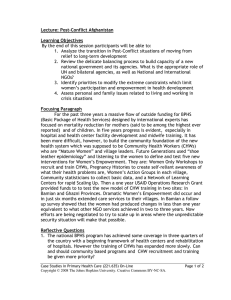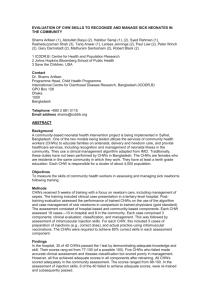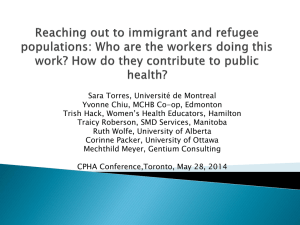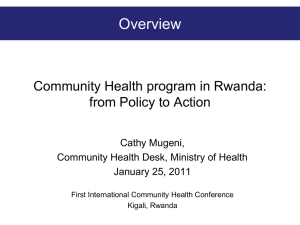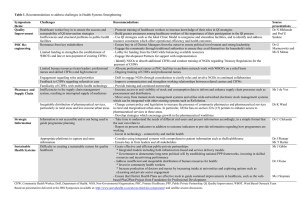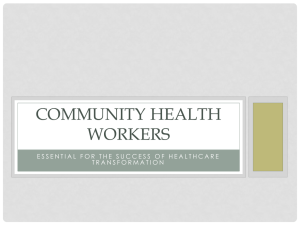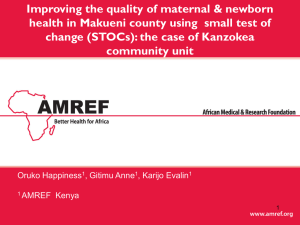Partnered Development of a Community Health Worker Model for Mental Health Outreach
advertisement
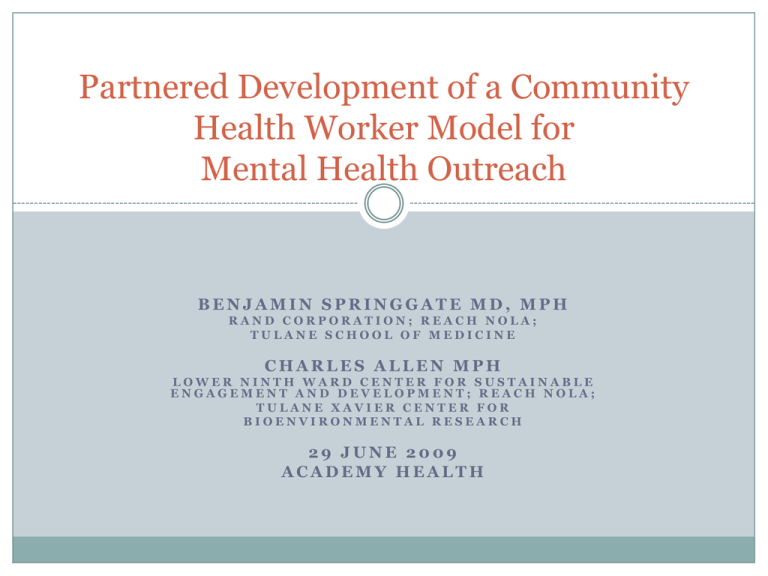
Partnered Development of a Community Health Worker Model for Mental Health Outreach BENJAMIN SPRINGGATE MD, MPH RAND CORPORATION; REACH NOLA; TULANE SCHOOL OF MEDICINE CHARLES ALLEN MPH LOWER NINTH WARD CENTER FOR SUSTAINABLE ENGAGEMENT AND DEVELOPMENT; REACH NOLA; TULANE XAVIER CENTER FOR BIOENVIRONMENTAL RESEARCH 29 JUNE 2009 ACADEMY HEALTH Post-disaster New Orleans, high unmet mental health needs persist Communities face high burden of mental illness 1 in 3 person estimated to experience symptoms of depression and or PTSD since Katrina/Rita (Kessler et al 2006), Thousands of providers displaced, many clinical agencies closed after hurricanes; access to specialty mental health remains limited (Springgate et al 2009; LPHI 2009) Quality care does not reach the post-disaster population despite a publicized mental health crisis Few people get appropriate or high quality mental health care (Wang et al 2007), despite significant health and societal benefits that such care would offer (Schoenbaum et al 2009) Community members in post-disaster setting are unlikely to seek mental health care Stigma of illness may prevent care-seeking behavior in post-disaster setting Primary care clinics, social service agencies, neighborhood associations may be more accessible to persons with mental health needs in post-disaster environment (Springgate et al 2007) As trusted entities, these organizations may facilitate entry into care, yet may have limited experience or training in dealing with mental health issues (Dossett et al 2005) REACH NOLA sought a partnered, public health response to the mental health crisis REACH NOLA’s partners identified need for: Increased access to mental health services for underserved community members, and particularly mental health outreach to improve access and utilization Broader implementation of models of evidence-based care to improve outcomes We hypothesized that partnered development of a community health worker (CHW) model for mental health outreach for depression might serve to meet community goals of improving access, but would face challenges in implementation and sustainability REACH NOLA’s goals in developing a new public health/mental health program Be responsive to community needs Acknowledge community strengths while being sensitive to post-disaster limitations in infrastructure Be consistent with key components of the collaborative care model of chronic disease management (Wagner, Austin, & Von Korff, 1996) such as promoting evidence-based treatments, care coordination, and patient participation Our goals in developing a public health/mental health program Build on existing CHW models that address mental health issues or health disparities Follow community-based participatory research (CBPR) principles, such as promoting equal power for community and academic partners and building community capacity while advancing knowledge (Jones & Wells 2007) REACH NOLA Mental Health Infrastructure and Training Project Components Training over 300 participants from partner agencies and other health and social services agencies Counselors Social workers Primary care providers Community health workers o o o o Support integrated evidence-based therapies and practices for treating depression and PTSD Collaborative care model of chronic disease management Problem solving treatment & cognitive behavioral therapy Medication management by primary care, with specialty provider consultation Care management and outcome tracking Development of CHW model for mental health outreach 23 training participants from original training in July 2008 volunteered to participate in CHW training development Emails, conference calls, in-person meetings, and partnered document review served as basis of training communication and collaboration by a community-academic working group We conducted a partnered qualitative evaluation of development, feasibility and impact using a teambased approach to qualitative research as applied to a partnered working group Results of Partnered CHW Model Development CHWs from social service, clinical, and nonprofit agencies worked with academic partners to adapt and develop training program and materials, with emphasis on Problem-solving treatment for CHWs Behavioral activation Cultural competency Self-care Role playing Materials Outreach manual Consent and confidentiality forms Co-authoring of article on model development, feasibility and impact CHW and case manger support group Community academic team also evaluated model development, feasibility, and impact The team identified six questions to frame analysis 1) What are the needs of residents? 2) How is outreach currently conducted and what do CHWs and community-based organizations need to address stress and depression? 3) How was the training developed and how did community input affect the training? 4) What role did partnership play and how did it develop? 5) In what ways did CHWs incorporate skills learned in the trainings and how did the model fit with their organizations? 6) What are the barriers, challenges, and successes CHWs face in implementing their role and what is the early impact and future potential? The team reviewed several data sources to evaluate development, feasibility, impact 31 email strings from work group members Field notes for 12 conference calls and for follow-up support calls Meeting minutes and action plans Semi-structured telephone interviews on experiences with the model from five CHWs who participated in the trainings and follow-up calls Training-participant survey regarding usefulness, clarity, cultural appropriateness, and comfort level in providing new services Highlights of Evaluation Results Most CHWs had tried or were routinely using the PHQ-2 or PHQ-9 While most found that this task was applicable to their job and that screening had high community acceptability, some reported awkwardness of screening in public locations or client resistance to addressing mental health issues. Participants acknowledged the helpfulness of guided role playing in training and the follow-up support calls that allowed them to discuss their application of training concepts in actual practice. Highlights of Evaluation Results Some CHWs commented on the usefulness of confidentiality/HIPAA training Training in problem solving and behavioral activation was novel for most CHWs. CHWs still felt awkward interfacing with clinical agencies and providers such as physicians Emphasis on cultural competency in trainings was well regarded CHWs noted several types of impact of training program on their work Increased hope that clients would receive needed care Opportunities for networking and certification were perceived as valuable by CHWs Potential of providing higher quality care and increased competitiveness for organizational funding were beneficial to CHWs’ employers and organizations Increased respect for CHWs improved their morale Potential Next Steps Prospective evaluation of the role of CHWs on access and quality of care for mental illness Development of additional resources to support longer term implementation of the model and additional training, including a CHW Training Institute Thanks to our partners Kenneth Wells, Elizabeth O’toole, Judy Ho, Loretta Jones, Bowen Chung, Jeanne Miranda and the entire UCLA RAND NIMH Partnered Research Center Jurgen Unutzer, Steven Vannoy, Wayne Bentham, Doug Zatzick, Rita Haverkamp, and University of Washington IMPACT Center Karen Desalvo, Ashley Wennerstrom, Donisha Dunn, Eboni Price, Shawna Herbst and Tulane Section of General Internal Medicine Diana Meyers and St. Anna Medical Mission Vicki Ngo, Brittany Butler, Eunice Wong, David Kennedy, Gery Ryan of the RAND Corporation REACH NOLA Board of Directors Holy Cross Neighborhood Association Common Ground Health Clinic Lower Ninth Ward Center for Sustainable Engagement and Development St. Anna Medical Mission St. Thomas Health Clinic Trinity Counseling and Training Center Contact information www.reachnola.org Ben Springgate benspringgate@gmail.com 504-491-3459 Charles Allen callen3@tulane.edu 504-296-7525 Special thanks to the American Red Cross and NIMH for their generous support of this project
